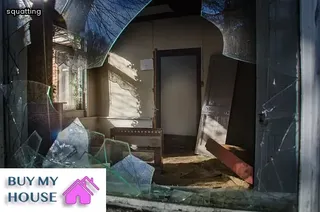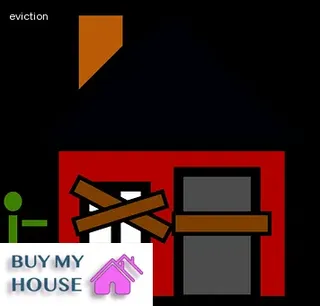In Iowa, squatters' rights are not explicitly outlined in the state's legal code. Many homeowners may be unaware of their own rights and potential liability when it comes to dealing with squatters.
It is important for all Iowa homeowners to understand the nuances of the law and their rights as a homeowner with regard to squatters. Squatters are defined as individuals who occupy a property without permission from the owner or legal authority.
In some cases, they may have been given permission but overstayed their welcome. In Iowa, squatters can claim certain protections under the Adverse Possession law which states that if an individual has lived in a home continuously for 15 years or more and paid taxes on the property, they can potentially gain ownership of it.
This applies to both residential and commercial properties and gives those who are considered “squatters” some additional protection under the law. Additionally, even if an individual does not meet this criteria, courts may still find them eligible for adverse possession if they have made improvements or maintained other aspects of the property such as paying utilities and taxes.
Understanding these rules is essential for any homeowner in Iowa since it helps identify what steps need to be taken if they encounter a squatter on their property.

A squatter is someone who takes up residence in a property without the permission of the owner. This often occurs when an individual moves into a home that is vacant or unoccupied, with no intention of paying rent or making any kind of agreement with the rightful owner.
In some cases, squatters can be found living in abandoned buildings, on land they do not own, or even within another person’s home. Squatting is illegal in many jurisdictions and individuals may be subject to eviction or other penalties for occupying a property without the authorization of its rightful owner.
It is important for Iowa homeowners to understand their rights under state law in order to protect their property from unauthorized occupation.
It is important to understand the difference between a squatter and a trespasser in order to protect your rights as an Iowa homeowner. Squatters are people who have taken up residence on someone else's property without permission or a legal lease; they often live there for an extended period of time and can gain certain rights of ownership.
Trespassers, on the other hand, are those who enter a property without permission but are usually not living on the premises. In Iowa, squatters may be removed from the property if they do not meet certain criteria such as having lived there continuously for seven years or more, while trespassers can typically be removed more easily by law enforcement.
Understanding the differences between these two terms is essential so that Iowa homeowners know what their rights are in each situation and how to protect them.

Claiming legal ownership of a property can be an intimidating process, but with the right knowledge, it can be done. In Iowa, the rights of homeowners are established by the state's squatter laws.
To legally claim ownership of property in Iowa, you must provide proof that you have been living on or using the land for a certain amount of time. This is known as adverse possession and requires that you have been occupying or using the land without permission from the original owner for at least 10 years.
You must also show that your use has been open and notorious and that you have paid all taxes associated with the property in question. Additionally, you must prove that you have made reasonable efforts to contact the original owner and inform them of your intent to claim ownership of their property.
By following these steps, anyone can take ownership of an abandoned piece of land in Iowa and begin to benefit from its properties.
In Iowa, adverse possession laws are in place to protect the rights of homeowners and ensure that land is not taken without permission. The state's statute of limitations for this type of property dispute is ten years with certain conditions met.
In order to qualify as an adverse possessor, a person must have been in continuous, exclusive, and open possession of the real estate in question for at least ten years, paying all taxes and assessments due on the property. Additionally, they must also provide evidence that they have made improvements to the land or made repairs over time.
The homeowner must also show that they have openly declared their intention to possess the land during this period by fencing it off or otherwise preventing others from accessing it. If all criteria are met, then a court will likely award ownership of the land to the adverse possessor.

Paying property taxes is an important responsibility for all homeowners in Iowa, and can be especially crucial when dealing with squatters. Property tax payments help to fund essential services like infrastructure and education, as well as protect owners of real estate from the potential costs associated with squatters on their land.
Homeowners should familiarize themselves with their local laws regarding how to handle these situations, such as how to evict a squatter or what remedies are available if a squatter has damaged property. Additionally, it's important for homeowners to be aware of any established deadlines for filing paperwork or taking action related to paying property taxes and dealing with squatters.
By understanding their rights as a homeowner in Iowa, individuals can ensure they are protecting themselves from any unwanted surprises that may come along with having a squatter on their property.
When it comes to handling squatting situations, the first step for Iowa homeowners is to research the state's squatting laws so that they can understand their rights and protect themselves. Knowing what actions are legal in Iowa will ensure that homeowners know how to respond if they come across a squatter on their property.
Homeowners should also be aware of what legal options are available to them, such as filing an eviction notice or using a forcible entry and detainer action. Additionally, it is important for homeowners to familiarize themselves with any applicable local ordinances and regulations related to squatting.
This can help them determine the best course of action when dealing with a squatter. Finally, depending on the circumstances, homeowners may want to seek professional advice from knowledgeable attorneys who can provide helpful guidance throughout the process.

As a homeowner in Iowa, it's important to understand and be aware of the state's squatter laws. Taking preventative measures to avoid squatter issues before they occur is key in protecting your rights as a homeowner.
It's advisable to always keep up-to-date with local ordinances, be familiar with the laws that apply to your property, and take steps like posting visible signs on your land that clearly indicate that it is private property. Furthermore, always be mindful of who you let on your property and keep an eye out for any suspicious activity.
Additionally, be sure to secure your home by installing locks and cameras if necessary. Finally, make sure you know who to contact if you do encounter squatters so that appropriate action can quickly be taken.
If you are a homeowner in Iowa and are dealing with an unwanted squatter, it is important to understand your rights and the resources available to help you. Fortunately, there are free services available that can provide advice on the laws regarding squatters in Iowa and how to handle them.
Local government websites often provide information on legal remedies for homeowners dealing with unwanted squatters, such as guidance on eviction procedures, tenant notices, and landlord/tenant rights. Additionally, there are a number of nonprofit organizations that specialize in tenant rights that offer free consultations and educational materials on the subject.
Finally, online communities dedicated to landlords and tenants can be used as a resource to exchange knowledge and experiences with other people who have gone through similar situations. By taking advantage of these resources, Iowa homeowners can gain a better understanding of their rights when it comes to dealing with squatters.

DoorLoop is the perfect tool for homeowners looking to understand their rights under Iowa's squatter laws. With DoorLoop, users can quickly and easily put their portfolio on autopilot with its powerful asset management tools.
It offers a comprehensive suite of features that allow users to monitor and manage their assets from one place, giving them peace of mind that all their investments are secure. From tracking rental income to keeping track of tenant payments, DoorLoop makes managing your portfolio simple and stress-free.
Additionally, DoorLoop includes a thorough overview of Iowa's squatting laws so users can accurately assess their legal rights as a homeowner. With DoorLoop, you'll be able to stay informed about your tenant's rights while simultaneously ensuring you’re in compliance with the law.
DoorLoop is the perfect platform to help homeowners better understand their rights in regards to Iowa's Squatter Laws. Whether you're looking to protect yourself against potential squatters or just want to brush up on the laws, DoorLoop has all the information you need.
With our easy-to-use platform and extensive knowledge base, you can quickly get a handle on your rights as a homeowner in Iowa. Plus, with our free demonstration feature, you can try before you buy - giving you peace of mind that DoorLoop is the right solution for your needs.
So don't wait any longer - request a DoorLoop demonstration today!.

Signing up for DoorLoop Services requires that you agree to their Terms of Use, which outlines the rights and responsibilities of both parties. To use the service, you must be 18 years or older and provide your legal name, a valid email address, and any other information required in order to complete the signup process.
You must also agree to not use DoorLoop's services for any illegal or fraudulent activities. Furthermore, you must acknowledge that DoorLoop reserves the right to modify or discontinue its services at any time without prior notice.
You should also be aware that DoorLoop is not responsible for any damage caused by using its services or by third parties' misuse of its services. Lastly, you must accept all risks associated with using DoorLoop's services and agree to indemnify and hold DoorLoop harmless in case of any losses incurred through your use of its services.
By signing up for DoorLoop Services, you are agreeing to these terms and conditions that govern your use of the service.
If you're a homeowner in Iowa and want to know how to evict a squatter, you're not alone. Squatters are individuals who may occupy property without permission from the rightful owner.
The first step in evicting a squatter is understanding your rights under Iowa law. Iowa law provides protections for homeowners who wish to remove squatters from their property.
Under state law, it's illegal for squatters to remain on the property if they have no legal right or claim of ownership over it. To evict a squatter, homeowners must provide written notice that the individual has 30 days to vacate the premises.
If the individual does not leave within this timeframe, then homeowners can file an eviction lawsuit with the local court system. It is important for homeowners to understand their rights when it comes to removing squatters from their property and following the proper legal procedure for eviction.
By educating yourself about Iowa's laws concerning squatters and taking appropriate legal action, you can ensure that your rights as a homeowner are protected.

Yes, Iowa does have adverse possession laws in place. According to Iowa law, a squatter can gain title to someones property through a period of continuous occupation of the land for at least 10 years.
To qualify as an adverse possessor, the squatter must prove that they are occupying the land openly and notoriously, paying all taxes and assessments on it, using it exclusively and continuously as their own, and having done so for more than 10 years. Homeowners should take steps to protect themselves from potential squatters by monitoring their property regularly and making sure it is posted with appropriate “no trespassing” signs.
In addition, homeowners should be aware of the details of Iowa's adverse possession laws in order to understand their rights as property owners.
Squatting in Iowa, or the act of occupying another person's property without their permission, can have serious legal implications for both the squatter and homeowner. According to Iowa state law, squatters can gain legal rights to a property after they have occupied it continuously for 15 years.
This period is known as the “adverse possession” period and is the shortest amount of time required for squatters to gain legal rights to a property. During this period, it is important that all homeowners understand their rights and responsibilities when dealing with individuals who are occupying their land unlawfully.
Homeowners should be aware of what constitutes as squatting in Iowa and how long a squatter needs to remain on the property before gaining any sort of legal rights.
No, Missouri does not have squatters rights. Squatters rights refers to the ability of a person to acquire legal title to land that they have been occupying without permission.
This is a process known as adverse possession, and it is not recognized in Missouri. In Iowa, however, understanding your rights as a homeowner can be complicated when it comes to understanding squatter's laws.
Uncovering Iowa's squatter laws can help homeowners better understand their legal rights and how to protect their property from potential squatters.